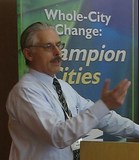How does a community weigh the benefits and liabilities of change driven by demand for land use?
Note to Reader:
On October 15 in Nanaimo, the “CAVI Forum within the VIEA Summit” will look back at what has been accomplished by the CAVI initiative over the past six years and look ahead to paint a picture of settlement, ecology and economy in balance. In Hour #1, a panel of five will bring to life the defining moments along the timeline for the period 2006 through 2012. In contributing his vignette, Tim Pringle will explain the genesis for the mantra “settlement change in balance with ecology”.
Water for Life and Livelihoods
The need for an approach that balances settlement change and ecology was first introduced by Tim Pringle at the Mini-Summit on Water for Life and Livelihoods, held in Whistler in May 2006. Prior to retirement, he was Executive Director of the Real Estate Foundation of BC. Although retired from his day job, the mission continues as a volunteer. He is a founding Director and the first President of the Partnership for Water Sustainability in BC.
 “The phrase water for life and livelihoods was ‘borrowed’ from work done in the United Kingdom,” states Tim Pringle. “It conveys the fundamental principles of sustainability of natural systems in their own right and in relation to the health and wellbeing of people who benefit from the use of water for basic life needs and economic activity.”
“The phrase water for life and livelihoods was ‘borrowed’ from work done in the United Kingdom,” states Tim Pringle. “It conveys the fundamental principles of sustainability of natural systems in their own right and in relation to the health and wellbeing of people who benefit from the use of water for basic life needs and economic activity.”
“The settlement in balance with ecology principle is an extension of water for life and livelihoods.”
Settlement and Ecology are Equal Values
“Settlement and ecology are equal values and they must be as much in balance as possible for wellbeing of human and natural systems,” stated Tim Pringle at the Whistler Mini-Summit. He then explained that:
- Habitation and ecology are interdependent.
- Although ecology can exist without habitation by man, habitation cannot exist without ecology.
- Both systems are finite and subject to change, including growth, decline and decay – in other words, some end state.
- Balance requires measurement. Often the required metrics are not available.
“Beginning in 2007, CAVI started a conversation on Vancouver Island around achieving settlement in balance with ecology.”
“Settlement and ecology are both complex systems; and the nature of their complexities means there is no easy answer to achieving a balance that will ensure water for life and livelihoods. Nevertheless, it is in our best interests to learn about both sides of the balance….if we are to ensure that settlement change results in benefits exceeding liabilities at the site, community and regional scales.”
Downloadable Document:
To download a PDF version of the complete article, click on Tim Pringle explains what “Settlement in Balance with Ecology” means.
To download a PDF version of a second story on this theme, click on What Drives Settlement on the East Coast of Vancouver Island, released in August 2009



